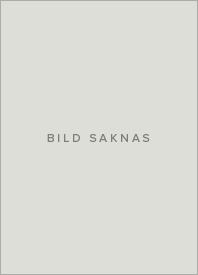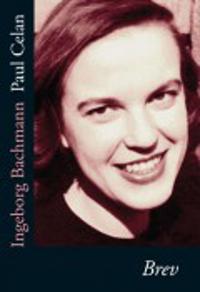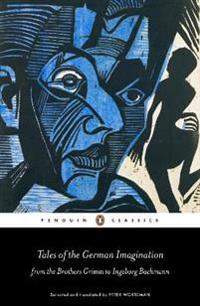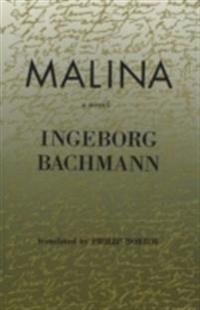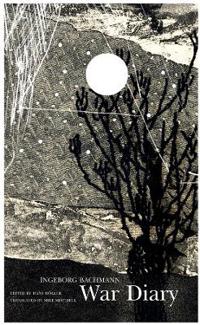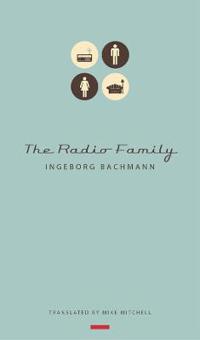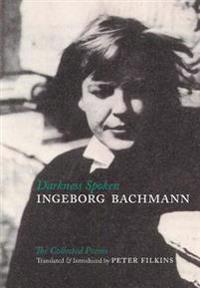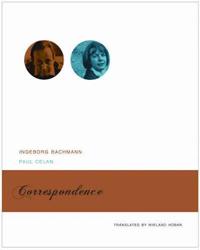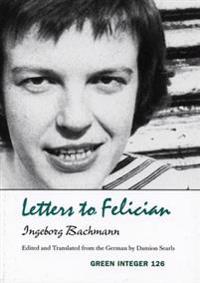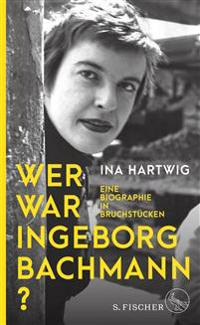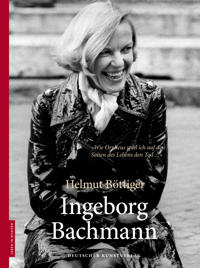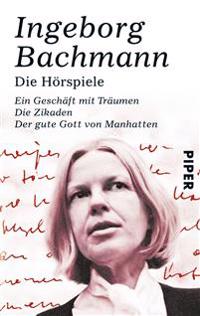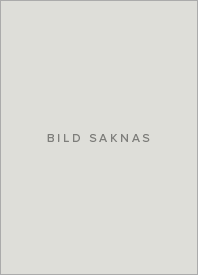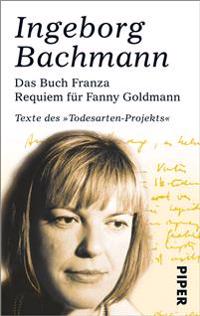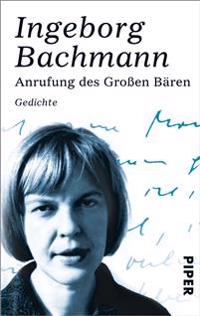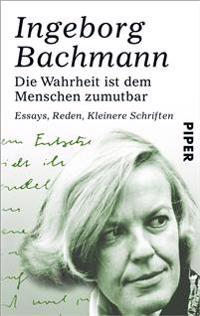Ingeborg Bachmann und Max Frisch (Inbunden)
avIngeborg Gleichauf
ISBN: 9783492054782 - UTGIVEN: 2013-10Ingeborg Bachmann und Max Frisch (Pocket)
avIngeborg Gleichauf
ISBN: 9783492306294 - UTGIVEN: 2015-01Brev (Inbunden)
avIngeborg Bachmann, Paul Celan, Ingeborg Bachman
ISBN: 9789172472761 - UTGIVEN: 201210Käre, käre Paul!
Igår och idag har jag tänkt väldigt mycket på dig, eller om du så vill, på oss. Jag skriver inte för att du ska skriva igen, utan för att det bereder mig glädje och för att jag vill.
Julen 1948 skriver Ingeborg Bachmann för första gången till Pau[...]Tales of the German Imagination from the Brothers Grimm to Ingeborg Bachmann (Häftad)
ISBN: 9780141198804 - UTGIVEN: 201212'It was a very momentous day, the day on which I was to be slaughtered'. Bringing together tales of melancholy and madness, nightmare and fantasy, this is a new collection of the most haunting German stories from the past 200 years. Ranging from the Romantics of the early nineteenth century to works[...]
Malina (Pocket)
avIngeborg Bachmann, Philip (TRN) Boehm, Mark Anderson
ISBN: 9780841911895 - UTGIVEN: 1999-06This is a work of sharp, unforgettable images and an irresistible narrative. Here is the story of lives painfully intertwined: the unnamed narrator, haunted by nightmarish memories of her father, lives with the androgynous Malina, an initially remote and dispassionate man who ultimately becomes an i[...]
War Diary (Inbunden)
avIngeborg Bachmann, Jack (CON) Hamesh, Hans (EDT) Holler
ISBN: 9780857420084 - UTGIVEN: 2011-10Austrian writer Ingeborg Bachmann (1926-73) is recognized as one of the most important novelists, poets, and playwrights of postwar German literature. As befitting such a versatile writer, her "War Diary" is not a day-by-day journal but a series of sketches, depicting the last months of World War II[...]
The Radio Family (Inbunden)
avIngeborg Bachmann, Joseph (EDT) McVeigh, Mike (TRN) Mitchell
ISBN: 9780857421913 - UTGIVEN: 2014-07Ingeborg Bachmann (1926-1973) is recognized as one of postwar German literature's most important novelists, poets, and playwrights. Influenced by Hans Weigel and the legendary literary circle Gruppe 47, Bachmann gained international renown for her poems, short stories, and novels, and won numerous a[...]
Darkness Spoken: The Collected Poems (Häftad)
avIngeborg Bachmann, Charles Simic
ISBN: 9780939010844 - UTGIVEN: 200608"Darkness Spoken" gathers together Ingeborg Bachmann's two celebrated books of poetry, as well as early and late poems not collected in book form, over 100 of them appearing in English for the first time, as well as 25 poems never before published in German. Bachmann is considered one of the most im[...]
Correspondence (Inbunden)
avIngeborg Bachmann, Paul Celan, Wieland Hoban
ISBN: 9781906497446 - UTGIVEN: 201008Paul Celan (1920-70) is one of the best-known German poets of the Holocaust; many of his poems, admired for their spare, precise diction, deal directly with its stark themes. Austrian writer Ingeborg Bachmann (1926-73) is recognized as one of post - World War II German literature's most important no[...]
Letters to Felician (Pocket)
avIngeborg Bachmann, Damion (TRN) Searls, Damion (EDT) Searls
ISBN: 9781931243162 - UTGIVEN: 2004-05Ingeborg Bachmann (1926-1973) was two of the major writers of the twentieth century: a poet who turned away from poetry, and a prose writer whose great project remained unfinished at her death. Letters to Felician came, both chronologically and conceptually, just before the fork in the road which di[...]
Ingeborg Bachmann
ISBN: 9783422071551 - UTGIVEN: 2013-03Ingeborg Bachmann geniesst den Ruf einer grossen Lyrikerin und einer Ikone des Feminismus. Sie beherrschte die Attitude der sensiblen, atherischen Grande Dame genauso wie die des "sussen Madels". Bachmann ist eine Dichterin, die uberraschend viele verschiedene Gesichter offenbart. Helmut Boettiger z[...]
Gedichte, Erzählungen, Hörspiel, Essays (Pocket)
avIngeborg Bachmann
ISBN: 9783492220286 - UTGIVEN: 2006-12Sämtliche Gedichte (Pocket)
avIngeborg Bachmann
ISBN: 9783492239851 - UTGIVEN: 200310Ingeborg Bachmanns Ruhm als eine der gröÃten Dichterinnen der europäischen Moderne. Sämtliche vollendeten Gedichte, von der frühen Lyrik bis zur >>Anrufung des GroÃen Bären<<, bilden den Kern ihres facettenreichen Werkes und gehören zu den groÃen dichterischen Leistungen d[...]
Das Buch Franza- Requiem für Fanny Goldmann (Pocket)
avIngeborg Bachmann
ISBN: 9783492242417 - UTGIVEN: 2004-10Ingeborg Bachmann hat mit >>Das Buch Franza< und="">>Requiem für Fanny Goldmann< zwei="">>Geschichten mit letalem Ausgang< geschrieben.="" sie="" berichten="" schonungslos="" über="" die="" soziale="" gewalt="" und="" die="" moralischen="" verbrechen="" innerhalb="" der="" gesellschaft,="" die="" [...]
Das dreißigste Jahr (Pocket)
avIngeborg Bachmann
ISBN: 9783492245500 - UTGIVEN: 200510Mit ihren berühmten Erzählungen bewies Ingeborg Bachmann, dass ihre Prosa die gleiche einmalige Kraft hat wie ihre Lyrik. In ihnen vermag sie mithilfe der Sprache der Bilder und Mythen alles über Liebe, Menschen und Verzweiflung zu sagen. Ihren Gestalten ist eines gemeinsam: das Leiden an d[...]
Die Wahrheit ist dem Menschen zumutbar (Pocket)
avIngeborg Bachmann
ISBN: 9783492272575 - UTGIVEN: 2011-12Briefe einer Freundschaft (Pocket)
avIngeborg Bachmann, Hans Werner Henze
ISBN: 9783492303934 - UTGIVEN: 2013-10Ingeborg Bachmann
ISBN: 9783499505454 - UTGIVEN: 1999-06Das Leben und Werk von Ingeborg Bachmann (1926 bis 1973) sind von Gerüchten und Legenden umstellt. Sie hat selbst den Mythos des gefährdeten modernen Künstlers für sich neu geschaffen, aber mit dem Blick für die geschichtliche Problematik der Literatur nach 1945 und für die Rolle der schreiben[...]

